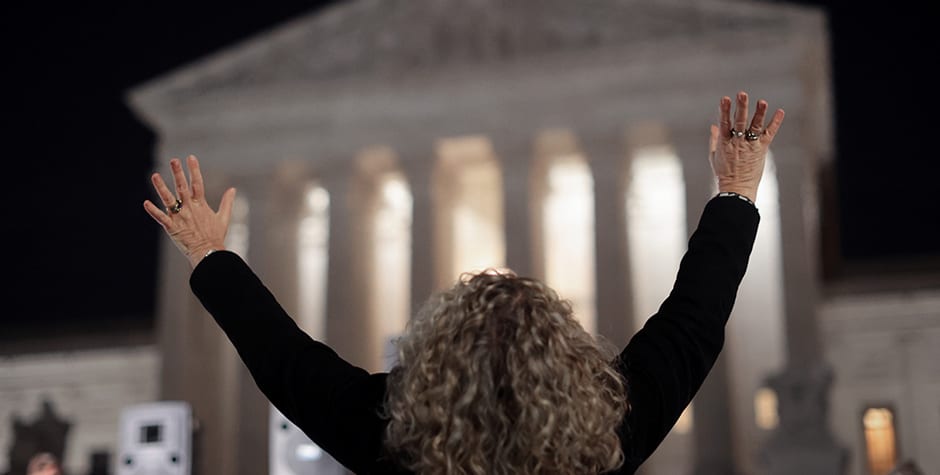As Supreme Court Considers Landmark Prayer Case, ACLJ Presents Oral Argument Before 11th Circuit Court of Appeals in Defense of Public Prayer
Today is the National Day of Prayer, and just last week, the ACLJ presented oral argument before the Eleventh Circuit Court of Appeals on behalf of the City of Ocala to defend the longstanding practice of prayer in our country and our First Freedom, religious liberty.
In the fall of 2014, the City came under attack following its vocal support for a community prayer vigil organized by local community leaders and attended by volunteer chaplains from the police department who provided prayer. The community prayer vigil was organized in response to a spree of shootings occurring in the City that resulted in the injury to two young children and an infant. The police department immediately responded by employing numerous methods to apprehend those responsible. At the time, tensions were high and the police faced challenges in convincing witnesses to come forward.
Pursuant to community policing standards, Police Chief Graham reached out to the local NAACP leaders to enlist their assistance. What followed from that meeting and another at the NAACP’s suggestion was the decision by private citizens and local community leaders to hold the vigil.
This vigil was no different from the hundreds that have been held across the country in response to division and violence. Indeed, just a few days ago, 8 miles from the federal courthouse in Montgomery, Alabama (where our oral argument was held) the Montgomery District Attorney’s Office participated in a community vigil held at the True Divine Baptist Church. And last month in Indianapolis, city leaders held a prayer vigil at a local church wherein the Indianapolis Metro Police Chief spoke from the pulpit and asked the community to step up and help fight crime throughout Indianapolis.
Plaintiffs in this case, however, want to put an end to these vigils. Imagine for a moment if the court were to conclude that volunteer chaplains for the police department (or any government entity) could no longer provide religious guidance and/or help lead religious ceremonies? Plaintiffs’ demand is startling and flies in the face of the First Amendment and the Supreme Court’s stated objective of the Religion Clauses: to foster tolerance and harmony, not hostility.
We are asking the Eleventh Circuit to reverse the decision issued by the lower court which held, in part, that because prayer is quintessentially religious – the City’s involvement with the community prayer vigil could not comport with the First Amendment and must be held unconstitutional.
As we noted for the 11th Circuit panel, the district court’s ruling ignores America’s long-time tradition of calling for prayer – a freedom our Founders sought to secure, rather than prohibit, through the ratification of the First Amendment. Time and again, the Supreme Court has upheld government involvement in and/or association with prayer including legislative prayer, prayer in the military, prayers offered by chaplains and calls to prayer following a crime spree or other tragic event. See Am. Legion v. Am. Humanist Ass’n, 139 S. Ct. 2067, 2088 (2019) (Gorsuch, J. concurring) (“the Establishment Clause permits a nondiscriminatory prayer at the beginning of a town council session”); Marsh v. Chambers, 463 U.S. 783, 793 (1983) (upholding legislature’s practice of opening sessions with a prayer offered by a chaplain paid with public funds). “Simply having religious content or promoting a message consistent with a religious doctrine does not run afoul of the Establishment Clause.” Van Orden v. Perry, 545 U.S. 677, 691 (2005).
The appeal also raises another important issue: Can a plaintiff sue when no injury other than offense and/or disagreement with prayer is alleged, and where the injury has been self-inflicted? In our case, the Plaintiffs testified that they opposed prayer but attended the community prayer vigil in order to observe the prayer and be offended by it. As one Supreme Court Justice recently reiterated: “The presence of a disagreement, however sharp and acrimonious it may be, is insufficient by itself to meet Art. III’s [standing] requirements.”).Am. Legion, 139 S. Ct. at 2099 (Gorsuch, J. concurring). “Offense alone [is] insufficient to convey standing.” Id.
As another court properly noted, “the Supreme Court has explained that a plaintiff’s ‘claim that the Government has violated the Establishment Clause does not provide a special license to roam the country in search of governmental wrongdoing and to reveal [his] discoveries in federal court.’” Am. Atheists, Inc. v. Levy County, 2017 U.S. Dist. LEXIS 198386, *10 (N.D. Fla. Dec. 3, 2017) (quoting Valley Forge v. Americans United, 454 U.S. 464, 487 (1982)). Simply put, “voluntary exposure to purportedly offensive conduct can[not] establish standing to obtain an injunction barring such conduct. To recognize standing in such circumstances would be to allow a plaintiff to ‘manufacture’ her standing.” Freethought Ass’n v. Moore, 893 F. Supp. 1522, 1535 n.26 (N.D. Ala. 1995).
It is critical that we protect our right to pray in public, including for government officials. It’s an issue that’s currently before the Supreme Court in a case we filed an amicus brief in. We will never stop defending prayer.
We’ll keep you updated as this critical case proceeds.
